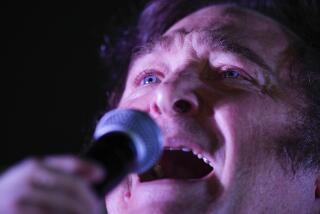Argentines Taking to the Streets, With Props
- Share via
BUENOS AIRES — Pablo Rizzo once worked at a fast food restaurant and a clothing store. Now he scratches out a living juggling for motorists in the street.
Working with plastic bowling pins, a unicycle and oversized black-and-white shoes, he clowns around for handouts at intersections when traffic stops.
“You have less than a minute to perform your act and earn your change,” says Rizzo, 23, a castoff from the traditional workday world of a country struggling in severe recession.
While many twentysomethings stand in long lines to interview for jobs or struggle in menial jobs, Rizzo and others are finding life easier working on the streets as clowns, jugglers and acrobats.
When the light turns red, Rizzo rushes into the street to perform his act and pocket change from the strangers waiting in their cars.
He says it even pays better than his old jobs. Many of his friends who work in the formal economy, in supermarkets or restaurants, earn as little as 300 pesos a month -- just over $100. Taxes take a bite and so does transportation, costs Rizzo doesn’t have.
“I can come and work whenever I want,” he says while juggling green neon bowling pins three at a time.
Manuel Oliver, a fellow juggler working the same intersection, says motorists will throw him a peso or two at a time, and he makes about 15 pesos an hour, about $5. Once someone tossed him a 50-peso bank note.
Clowns, jugglers, acrobats and trapeze artists have also started a school in a rundown warehouse.
Young men walk on a tightrope strung just above the ground while others ride unicycles, swing on trapeze bars and juggle.
They perform two shows on weekends at the warehouse, drawing an audience and earning enough pesos to feed themselves.
Matias Mino, 23, says his parents are both professionals who tried to discourage him from performing. He says he still has time to think of taking up engineering or medicine, the professions of his parents.
“This for me is sheer freedom. You are free to express yourself whereas if you had to work for a business they would tell you what you have to do,” Mino says. “My friends who are working are almost slaves.”
He says many young people have gone to Europe, part of the exodus of as many as 500,000 Argentines who have fled the economic crisis that saw street riots at the end of 2001. Although the situation is not as desperate now, unemployment is still a near record 18% and one in two Argentines lives in poverty.
Mino says even young Argentines with university degrees in professions like architecture and law are working as waiters and waitresses -- or in other jobs their degrees didn’t prepare them for.
“Our country is stuck in a rut,” he says.
The performers note they have taught each other without outside help.
Sometimes they don’t have enough money to fix the sound system, and they can’t afford imported unicycles and other props. But they’ve honed their skills to the point where companies now hire them to perform at meetings and other events.
“We all work together,” Mino says.
More to Read
Sign up for Essential California
The most important California stories and recommendations in your inbox every morning.
You may occasionally receive promotional content from the Los Angeles Times.










